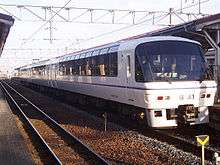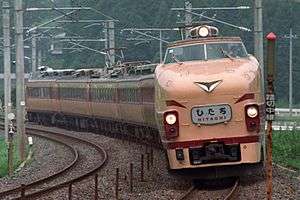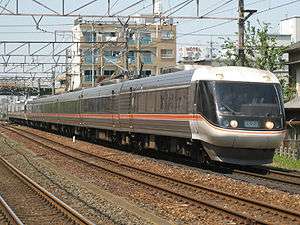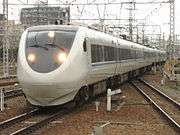211 series
| 211 series | |
|---|---|
 JR East 211 series set on a Takasaki Line service in May 2007 | |
| Manufacturer | Hitachi, Kawasaki Heavy Industries, Kinki Sharyo, Nippon Sharyo, Tokyu Car Corporation |
| Replaced | 113 series, 115 series |
| Constructed | 1985–1991 |
| Entered service | 1985 |
| Scrapped | 2012–Present |
| Operator(s) |
|
| Specifications | |
| Car body construction |
Stainless steel Steel (JR-West version) |
| Car length | 20,000 mm (65 ft 7 in) |
| Width | 2,966 mm (9 ft 8.8 in) |
| Doors | 3 pairs per side |
| Maximum speed |
110 km/h (JR-West 120 km/h) |
| Traction system | Resistor control + field system superimposed field excitation control |
| Acceleration | 1.7 km/h/s |
| Electric system(s) | 1,500 V DC |
| Current collection method | Overhead catenary |
| Bogies |
DT50B (motored), TR235B (trailer)(211-0/1000/2000/3000 series) TR235G (SaRo 213/SaRo 212) C-DT56 (motored), C-TR241 (trailer) (211-5000/6000 series) WDT50B (KuMoRo 211/MoRo 210) |
| Multiple working | 311/313 series |
| Track gauge | 1,067 mm (3 ft 6 in) |
The 211 series (211系 211-kei) is a suburban electric multiple unit (EMU) train type introduced in 1985 by Japanese National Railways (JNR), and currently operated by East Japan Railway Company (JR East) and Central Japan Railway Company (JR Central) and formerly also operated by West Japan Railway Company (JR-West) in Japan.
Design
The 211 series was developed by JNR to replace older 113 series and 115 series trains. The 211 series incorporated regenerative brakes and stainless body construction.
Variants
- 211-0 series (basic version with transverse seating)
- 211-1000 series (cold region version with transverse seating)
- 211-2000 series (basic version with all longitudinal seating)
- 211-3000 series (cold region version with all longitudinal seating)
- 211-5000 series (JR Central version)
- 211-6000 series (JR Central version with single motored car)
- Joyful Train variants (JR-West version)
Operations
211-0, 211-2000 series

211 series in original JNR livery in August 1988
- Tōkaidō Main Line and Ito Line: Tokyo – Numazu/Ito (From 1986 - April 2012)
- Tōkaidō Main Line: Hamamatsu – Maibara
- Chūō Main Line: Tachikawa – Shiojiri
- Shinonoi Line: Shiojiri – Shinonoi
- Shinetsu Line: Shinonoi – Nagano
211-1000, 211-3000 series
211-3000 series in Chiba area livery in October 2006

211-3000 series in Nagano area livery in March 2013
- Tohoku Main Line: Oyama – Utsunomiya[1]
- Takasaki Line: Ueno - Takasaki (Since 1986 - March 2014)
- Ryomo Line: Takasaki – Oyama
- Shinetsu Line: Shinonoi – Nagano
- Oito Line: Matsumoto –Shinano-Omachi
- Chuo Main Line: Tachikawa – Shiojiri/Shiojiri – Nakatsugawa
- Shinonoi Line: Shiojiri – Shinonoi
- Shinetsu Main Line: Shinonoi – Nagano
- Sobu Main Line: Chiba – Chōshi (via Yachimata) (since 21 October 2006 - 2012)[2]
- Narita Line: Chiba – Chōshi (via Narita) (since 21 October 2006 - 2012)[2]
- Kashima Line: Sawara – Kashima-Jingu (since 21 October 2006 - 2012)[2]
- Togane Line (since 21 October 2006)[2]
- Uchibo Line: Chiba – Awa-Kamogawa (via Kisarazu) (since 21 October 2006 - 2012)[2]
- Sotobo Line: Chiba – Awa-Kamogawa (via Katsuura) (since 21 October 2006 - 2012)[2]
- Iida Line (since 15 March 2014)[3]
- Agatsuma Line (since 22 August 2016)[1]
- Joetsu Line: Takasaki - Minakami (since 23 August 2016)[1]
211-5000, 211-6000 series

211-5000 series in Shizuoka area livery in June 2008
- Tokaido Main Line: Atami – Maibara
- Chuo Main Line: Nagoya – Nagiso
- Kansai Main Line: Nagoya – Kameyama
- Aichi Loop Line: Kozoji – Okazaki
Joyful Train sets

Joyful Train 211 series in JR-West Livery in January 2007
- Super Saloon Yumeji: Three-car set converted from 211 and 213 series coaches which entered service in 1988 and withdrawn in March 2010. Operated by JR-West and based at Okayama Depot.
See also
References
- 1 2 3 上越線・吾妻線で211系の営業運転開始 [211 series enter service on Joetsu Line and Agatsuma Line]. Japan Railfan Magazine Online (in Japanese). Japan: Koyusha Co., Ltd. 24 August 2016. Retrieved 27 August 2016.
- 1 2 3 4 5 6 "10/21, 房総211系, 営業運転開始" [Boso 211 series enter service]. Japan Railfan Magazine (in Japanese). 47 (549): 179. January 2007.
- ↑ 飯田線での長野色115系運用終了,211系運用開始 [Nagano-livery 115 series withdrawn from Iida Line; 211 series introduced] (in Japanese). Japan. 15 March 2014. Retrieved 15 March 2014.
External links
| Wikimedia Commons has media related to 211 series. |
- JR East 211 series (in Japanese)
- JR Central 211 series information (in Japanese)
This article is issued from
Wikipedia.
The text is licensed under Creative Commons - Attribution - Sharealike.
Additional terms may apply for the media files.


